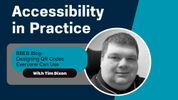Recently, I was talking with a connection who had just undergone medical treatment and left with a stoma bag. The operation was unexpected and the outcome has left them unable to travel into an office. They are a very experienced professional but are finding recruitment agencies won't even put them forward as they can't visit an office occasionally.
The roles being applied for are remote and don't need the employee to be physically present, yet most companies still demand that an employee can attend site on an as and when needed basis. Therefore, my connection isn't even being put forward, which is disability discrimination. I don't believe for a second that the companies and recruiters involved are intentionally discriminating, it is just that the request isn't what they are used to and life is easier when it fits the usual profile.
I was curious if other companies would have a similar view on employing someone who can't attend site. I asked some of my other connections and was disappointed, but sadly not surprised, to hear that they do need people to attend site occasionally, although there is nothing stopping someone doing the job remotely 100% of the time...
This is happening at recruiters of all sizes for roles with companies small and large with clear diversity, equality, and inclusion (DEI) policies. In my recent post Disability at Work: The Forgotten Diversity, I explored how disability is often forgotten in DEI initiatives and highlighted that more work is needed.
In 2023, we as employees and employers need to challenge our perceptions, policies, and DEI initiatives to be more inclusive, more aware of people and their needs and less rigid in what a good employee looks like.
If you are a manager, it is easy to think that DEI is HR's responsibility or an agencies responsibility, when in fact it is up to everyone in the recruitment chain to be more inclusive and ensure we get the best person for the role.
The lack of awareness and unconscious bias in all of us should be addressed. We do this through looking at what a candidate brings to the role, not the perceived hurdles. People with disabilities know the hurdles and know how to navigate them. Talk with candidates and ask what they need from you to be successful in the role. You will be surprised how little is needed and how resourceful disabled candidare are!
One in four U.S. adults has a disability which impacts major life activities, according to the Centers for Disease Control and Prevention, including difficulty in hearing and seeing, in mobility like climbing stairs, in cognition like concentrating and in living independently and taking on activities like dressing. Altogether, 61 million Americans have a disability. Despite the added challenges in day-to-day life, much of this population can work — and wants to. But many encounter challenges in their attempts. In 2022, only 21.3% of the population of people with disabilities was employed, according to the Bureau of Labor Statistics.
 unknownx500
unknownx500
















